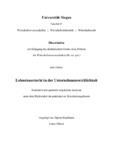Citation link:
https://nbn-resolving.org/urn:nbn:de:hbz:467-11413Files in This Item:
| File | Description | Size | Format | |
|---|---|---|---|---|
| Dissertation_Lukas_Hilbert.pdf | 2.36 MB | Adobe PDF |  View/Open |
| Dokument Type: | Doctoral Thesis | metadata.dc.title: | Lohnsteuerrecht in der Unternehmenswirklichkeit : normative und qualitativ-empirische Analysen unter dem Blickwinkel der präskriptiven Entscheidungstheorie | Other Titles: | German wage tax in business practice : normative and qualitative-empirical analysis from a perspective of prescriptive decision theory | Authors: | Hilbert, Lukas | Institute: | Fakultät III - Wirtschaftswissenschaften, Wirtschaftsinformatik und Wirtschaftsrecht | Free keywords: | employment taxation, business administration, tax law, expert interview, empirical social research | Dewey Decimal Classification: | 340 Recht | GHBS-Clases: | QUNE | Issue Date: | 2016 | Publish Date: | 2017 | Abstract: | Der Einfluss des deutschen Lohnsteuereinbehalts auf das individuelle Betriebs- und Unternehmensgeschehen stand bisher nur selten im Fokus der betriebswirtschaftlichen Steuerlehre. Vor diesem Hintergrund werden in der Arbeit praktische Auswirkungen theoretisch intensiv diskutierter Aspekte der deutschen Lohnbesteuerung im nationalen und internationalen Umfeld untersucht. Die Analyse gliedert sich – nach Darlegung von Problemstellung, Zielsetzung, Untersuchungsgang sowie Themeneinordnung und -abgrenzung – in ihren Hauptabschnitten in eine zunächst deskriptive Besprechung und Stellungnahme zu den einzelnen Tatbeständen sowie dann in eine qualitativ-empirische Prüfung ebendieser Gesichtspunkte anhand von zehn leitfadengestützten Experteninterviews (Besprechungen mit fachverantwortlichen Unternehmensvertretern). Schwerpunkte der Darstellung sind dabei der steuerrechtliche Arbeitnehmerbegriff, die Umgrenzung des Arbeitslohns (nebst Werbungskostenerstattungen und Steuerfreistellungen), die Anknüpfung des Lohnsteuerabzugs sowie Lohn- und Einkommensteuerpauschalierungen auf Arbeitgeberebene, die Instrumente der Finanzverwaltung zur Prüfung, Absicherung und Kontrolle des Lohnsteuerabzugs (insbesondere auch mit Diskussion der Arbeitgeberhaftung) sowie Fragen des grenzüberschreitenden Personaleinsatzes nach nationalem deutschen Steuerrecht und entlang der Doppelbesteuerungsabkommen. Eingebettet ist die Untersuchung in das theoretische Rahmenkonzept der präskriptiven Entscheidungstheorie, wodurch es möglich wird, zu beurteilen, nach wessen Interessenlagen das bestehende Lohnsteuersystem ausgerichtet ist. Abschließend werden – vor einer zusammenfassenden Schlussbetrachtung – mehrere Vorschläge zur etwaigen Anpassung der deutschen Lohnbesteuerung unterbreitet. Unterstützt wird die Ausarbeitung neben einführenden Hinweisen zur Darstellungsmethodik durch 30 – im Verlauf der Schrift wiedergegebene – inhaltsbezogene Schaubilder und Übersichten. German employers are obliged to withhold wage tax for their employees at source, being – in principle – a pre-payment to the taxpayer’s individual income tax burden. This traditional system hitherto was only rarely subject to detailed analysis from the position of the tax business administration function, so quite little is known about the impact on enterprises. Hence, in this doctoral thesis practical implications of national and international aspects of wage taxation intensively discussed in theory are analysed, judged and presented (in German). First, the thesis’ issue and objective as well as the course of investigation and the definition of scope are outlined. The following main chapters are divided into a descriptive review and comments on the wage tax positions analysed and – consecutively – the presentation of the results of an empirical assessment process. For the latter ten qualitative guideline oriented interviews with professional wage tax experts from German business practise were conducted. Overall key aspects of the research process are the German employee definition for tax purposes, the demarcation of taxable wage (including reimbursement of income-related expenses and tax exemptions), the rules that tie employers to withhold German wage tax, employee related lump-sum taxation opportunities at employer level, the tax authorities’ instruments to protect, audit and monitor the withholding process (especially including a discussion of the employer liability regulations) as well as issues of cross-border employment under German national and double tax treaty law. The concept of prescriptive decision theory is used as a general framework to the thesis allowing judgement regarding the attribution of the current German wage tax withholding system to the objectives of all relevant parties involved. Prior to an overall summary and conclusion several starting points for possible amendments of the present regime are proposed. Introductive reference to the form of presentation and 30 content-related illustrations within the text body facilitate the thesis’ design. |
URN: | urn:nbn:de:hbz:467-11413 | URI: | https://dspace.ub.uni-siegen.de/handle/ubsi/1141 | License: | https://dspace.ub.uni-siegen.de/static/license.txt |
| Appears in Collections: | Hochschulschriften |
This item is protected by original copyright |
Page view(s)
1,116
checked on Dec 25, 2024
Download(s)
978
checked on Dec 25, 2024
Google ScholarTM
Check
Items in DSpace are protected by copyright, with all rights reserved, unless otherwise indicated.

